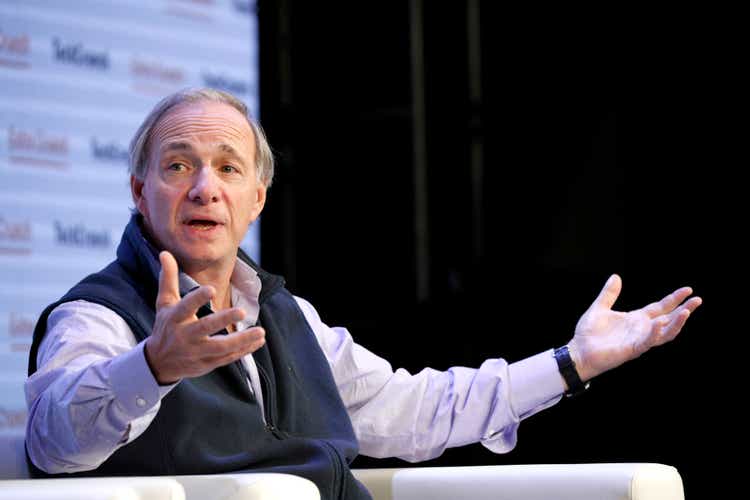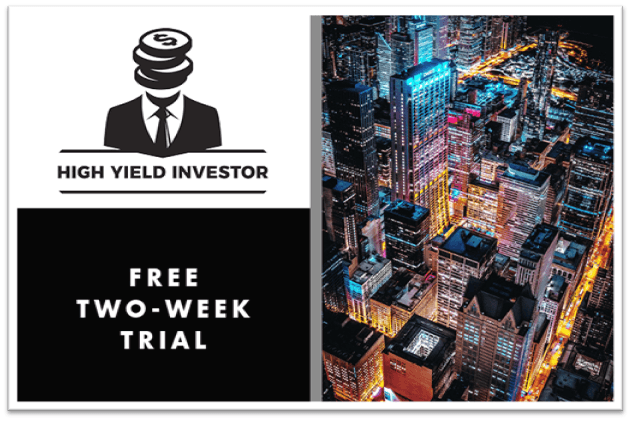Billionaire Ray Dalio Says World Order 'Radically Different' Next Year: Our Picks
Summary
- Ray Dalio recently predicted rapid and dramatic changes for the global economy and geopolitical world order.
- We take a look at his analysis and advice.
- We also share our own macro perspective and approach to investing in the rapidly changing environment, along with several of our top picks of the moment.
- Looking for a portfolio of ideas like this one? Members of High Yield Investor get exclusive access to our subscriber-only portfolios. Learn More »

Kimberly White
The world order is changing rapidly and this has significant ramifications for how investors should think about allocating their capital, according to recent statements by Billionaire Ray Dalio. In this article, we will break down his recent remarks, discuss our perspective on the changing world order, and then close by sharing some of our top picks to navigate the evolving macro environment.
Ray Dalio: The Radically Different World Of Tomorrow
Billionaire hedge fund investor Ray Dalio recently advised investors to:
Pay attention to the implications of the great disruptions that are going to take place because the world...is going to become radically different year by year...It’s like going through a time warp. We’re going to be in a different world. And the disruptors will be disrupted. I don’t need to pick those who are creating the new technologies. I need to really pick those who are using the new technologies in the best possible way...The world landscape is changing, the world order is changing
At a minimum, Mr. Dalio was clearly referencing the dramatic changes that emerging technologies such as artificial intelligence will have on our world in the coming months and years. Moreover, when taken together with many of his other recent comments and publications, he was also likely referencing the world's rapidly evolving geopolitical status quo. The geopolitical status quo is going through several tectonic shifts right now, including increased power for the global South and East, a growing rift behind China, Russia, and their allies (such as Iran, North Korea, and a plethora of developing nations) and the United States, Europe, Japan, South Korea, and several other developed countries.
Moreover, countries like India and Brazil are growing in geopolitical power and influence as well, particularly through vehicles like BRICs, which are even exploring the potential of launching their own gold-backed currency to serve as competition for the U.S. Dollar. Last, but not least, while the United States remains the leading global superpower by many metrics, it is clearly declining in power and influence relative to China, forcing it to lean ever more heavily on its partners and allies across the world in order to protect and project its interests on those respective regions. The two most glaring instances of that in today's world are the growing roles of Japan, South Korea, Australia, and the Philippines in countering growing Chinese influence in East Asia and European partners in resisting Russia's expansionist efforts in Ukraine.
What does all of this mean for investors according to Ray Dalio?
I would like to have diversification because what I don’t know is going to be much greater than what I do know. Diversification can reduce your risk without reducing your returns sharply if you know how to do it well.
Moreover, he stated that he thinks that the biggest mistake many investors make is:
believing that markets that performed well, are good investments, rather than more expensive.
Our View On The Macro Environment
We agree with Ray Dalio on each of these major macro observations, though we differ from him on some of the details on how to specifically invest.
The world is certainly changing rapidly and the rate of change is only increasing as technology rapidly evolves. This acceleration in economic change is going to be particularly acute moving forward given the growing role of artificial intelligence in developing new technologies, which streamlines and speeds up the process of previously time-consuming and labor-intensive tasks such as looking up information or putting together code to perform core programming functions on new software development. These tasks can now be performed in seconds thanks to the power of new artificial intelligence tools such as Chat-GPT and similar tools that mega-cap tech companies such as Microsoft (MSFT), Amazon (AMZN), Apple (AAPL), Alphabet (GOOG)(GOOGL), and Meta (META) are investing so aggressively in.
Moreover, companies like Tesla (TSLA) are developing very highly advanced real-world artificial intelligence that could very soon result in fully autonomous driving capability (which - once fully scaled - will unlock untold billions of dollars in hours that were previously wasted on transportation) as well as highly productive humanoid robots that will be able to replace many of the menial, low-wage, low-skill tasks previously done by humans.
When you add in the further employee time and corporate expense savings from the growing work-from-home movement and the enterprise-wide productivity enhancements being driven by the data analytics and machine learning platforms of companies like Palantir Technologies (PLTR), and the deflationary and quality improvement potential awaiting the global economy is immense. The changes bound to flow from these innovations are likely to radically alter our world year after year moving forward.
Moreover, this rapid technological change along with the powerful and widening ideological differences among the world's major powers are likely to lead to an increasingly fractured world order in the months and years to come.
What these two major factors - rapid technological change leading to major economic upheaval and industry disruptions and the fracturing global order under two competing major blocs led by the United States and China - mandate is that investors diversify against the uncertainties that both bring. Ray Dalio is spot on about the necessity for intelligent diversification and that the past success of a strategy, asset class, or market does not in any way guarantee its future viability as a prudent path to long-term wealth compounding.
Some Of Our Top Picks
Where we differ somewhat from Mr. Dalio is the specifics on where to invest. He appears to be very bullish on Asia, including China. Politics and ethical implications aside, investing in Communist China has little appeal to us from a pure financial standpoint because - while valuations certainly look appealing on paper - the country's decades-long track record of accounting fraud and the Chinese Communist Party's growing interference in the economy (e.g., its major disruption of Chinese tech giant Alibaba (BABA)) make it uninvestable in our view. Moreover, the growing risk of a Chinese invasion of Taiwan and the massive carnage that would likely follow for the Chinese economy add an additional huge and hard-to-quantify risk for Chinese investments.
That said, we do agree with him that diversification is important, including away from markets and securities that have performed exceptionally well in the recent past. As value investors, we try to tune out the noise that comes from recent stock price momentum and instead focus on comparing an investment's intrinsic value to its current market price. This has generally steered us away from an overallocation to technology stocks (QQQ) or even investing in the S&P 500 (SPY) directly and instead towards higher yielding value stocks that have sold off disproportionately to the rapid rise in interest rates over the past few years. Moreover, we are emphasizing defensively positioned, high-quality businesses within the high-yield value category that are well-positioned to thrive in the face of rapid economic change from technological innovation and a potential recession in the near term. Examples include Enterprise Products Partners (EPD) and Brookfield Renewable Partners (BEP)(BEPC) (energy will always be needed regardless of technological innovation and the contracted nature of these businesses makes them highly recession-resistant).
Moreover, given the aforementioned major geopolitical changes going on, being diversified into precious metals like gold (GLD) and silver (SLV), securities that profit from massive spikes in volatility (VIX) such as Virtu Financial (VIRT), and an opportunistic allocation to - in our view - deeply undervalued Latin American alternative asset manager Patria Investments (PAX) are prudent. We like PAX because it has considerable exposure to Brazil and Mexico - which are growing global economic powers and are poised to benefit from the West's ongoing decoupling from China - as well as due to its accrued performance earnings which currently constitute a whopping ~20% of its market cap and will likely be distributed as dividends alongside its already hefty dividend yield that comes from strictly fee-based earnings.
Investor Takeaway
Mr. Dalio expects the world to change dramatically as soon as next year and predicts that it will continue to change radically year after year following that. We agree that rapid change is coming and that it is very difficult to pick the winners and losers, especially in the technology space. As a result, we think that diversification and an emphasis on value is prudent and - given the substantial and growing geopolitical risks facing the global economy - diversifying with these in mind is particularly prudent.
Editor's Note: This article discusses one or more securities that do not trade on a major U.S. exchange. Please be aware of the risks associated with these stocks.
If you want full access to our Portfolio and all our current Top Picks, feel free to join us at High Yield Investor for a 2-week free trial
We are the #1-rated high-yield investor community on Seeking Alpha with 1,500+ members on board and a perfect 5/5 rating from 150+ reviews:
You won't be charged a penny during the free trial, so you have nothing to lose and everything to gain.
Start Your 2-Week Free Trial Today!
This article was written by
Samuel Smith is Vice President at Leonberg Capital and manages the High Yield Investor Seeking Alpha Investing Group.
Samuel is a Professional Engineer and Project Management Professional by training and holds a B.S. in Civil Engineering and Mathematics from the United States Military Academy at West Point and a Masters in Engineering from Texas A&M with a focus on Computational Engineering and Mathematics. He is a former Army officer, land development project engineer, and lead investment analyst at Sure Dividend.
Analyst’s Disclosure: I/we have a beneficial long position in the shares of GLD, SLV, EPD, BEP, PAX, VIRT either through stock ownership, options, or other derivatives. I wrote this article myself, and it expresses my own opinions. I am not receiving compensation for it (other than from Seeking Alpha). I have no business relationship with any company whose stock is mentioned in this article.
Seeking Alpha's Disclosure: Past performance is no guarantee of future results. No recommendation or advice is being given as to whether any investment is suitable for a particular investor. Any views or opinions expressed above may not reflect those of Seeking Alpha as a whole. Seeking Alpha is not a licensed securities dealer, broker or US investment adviser or investment bank. Our analysts are third party authors that include both professional investors and individual investors who may not be licensed or certified by any institute or regulatory body.
Recommended For You
Comments (1)




